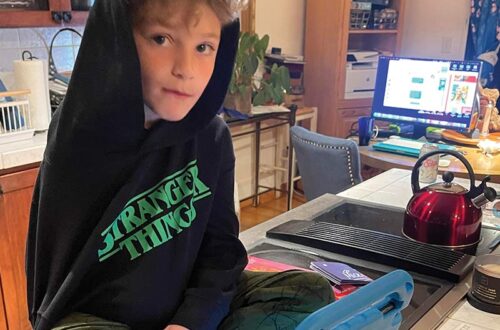
School Should Start Later to Give Teens More Sleep
As her teenage son groggily dragged himself out of the house and into the car at 7:10 am to make it to school on time, Lisa Lynn Lewis wondered if he was even capable of absorbing information in those first few hours of the day. “He was hardly alert, and definitely not in an optimal state to be showing up to school ready to learn.
It was his first year of high school, and classes started at 7:30 am. “That was the earliest he’d ever had to go to school, and it really felt too early for all of us,” she said. She was right.
Last July, state Senate Bill No. 328 went into effect, making California the first state to mandate later start times for middle and high schools because of the overwhelming evidence that early start times disrupt teenagers’ normal sleep cycle. Beginning this year, middle schools cannot start earlier than 8:00 am and high schools no earlier than 8:30 am. There are exceptions for schools that are considered rural, such as San Lorenzo Valley High School, which has maintained a start time of 7:55 am.
Lewis, a journalist and author of “The Sleep Deprived Teen,” played a key role in initiating the switch to later school start times in California.
In 2015, as she witnessed her exhausted son struggling to make it to school in the mornings, she turned her focus toward researching and writing about early school start times and its effect on teen sleep and health. She found a wealth of research existed on the topic. In fact, in 2014, the American Academy of Pediatrics released an official policy statement recommending that middle and high schools start no earlier than 8:00 am and 8:30 am, respectively, because earlier start times were disrupting teenagers’ normal sleep cycle and having negative effects on teen health.
“We’ve known for a long time, I’d say for decades, that teenagers experience a natural change in their sleep cycle called the delayed sleep phase, which causes them to stay up late and wake up late,” explained Dr. Zachary Adams, a sleep medicine physician for Sleep Health MD in Santa Cruz. “Teens are going to stay up late no matter what,” he said. “So early school start times just deprives them of those extra few hours of sleep they would get if they were able to sleep on their natural schedule.”
Studies have found that early start times for high school age kids are associated with a variety of undesired outcomes, such as more car accidents and poorer academic performance, Adams said.
“Sleep is something that you spend a third of your life doing, so it makes sense to prioritize it just as we do other aspects of health, no matter what age,” Adams said. For teenagers, getting eight to 10 hours of good quality sleep every night is critical as they navigate this major transitional stage of life.
In September 2016, Lewis wrote an opinion piece for the LA Times titled “Why Schools Should Start Later in the Day.” The article caught the eye of state Sen. Anthony Portantino, who was also a parent of a teen at the time. “And it just so happened their high school was in the midst of conversations about changing the school start time, so this topic resonated with him,” Lewis said.
Portantino dug into the issue further, and with the support of Lewis, the California Parent Teachers’ Association, and Start School Later, a non-profit organization that’s been advocating for later school start times since 2011, introduced a bill to the state legislature in February 2017.
After a two year process to obtain approval from the senate and state assembly, Governor Jerry Brown vetoed it, stating that school start times “should be decided at the local level,” Lewis said. “So that was, needless to say, very, very disappointing.”
Determined, Portantino reintroduced the bill in 2019, and shepherded it through the approval process once again. By this time, Gavin Newsom had entered office as the new governor, and Portantino immediately visited Newsom to speak with him about the bill. A few months later, Newsom signed the late start bill into law in October 2019.
“School start times are the biggest policy change that can impact teen sleep, so that’s why this is so important,” Lewis said. “By the time kids are juniors or seniors, they may start looking like adults, but they’re not adults yet” – they still need a lot of sleep.






